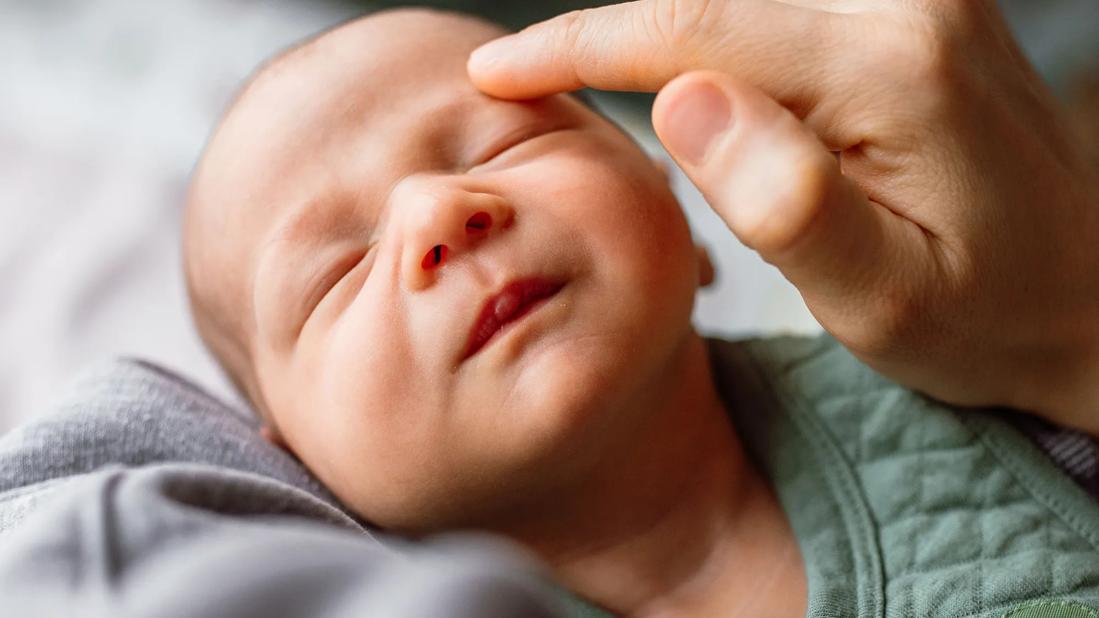Your baby can develop lip blisters from an infection or because of the way they feed

Image content: This image is available to view online.
View image online (https://assets.clevelandclinic.org/transform/04fdc599-c236-43dc-aef1-0f3bd0fdfa49/newborn-lip-blister-2031340689)
Face of sleeping newborn baby, face being lightly touched by caregiver hand
Out of tiny baby lips come gentle coos, sleepy yawns and needy cries. But wait — what’s that blister on your baby’s lip? Should you worry? That depends on what the blister looks like.
Advertisement
Cleveland Clinic is a non-profit academic medical center. Advertising on our site helps support our mission. We do not endorse non-Cleveland Clinic products or services. Policy
“A single fluid-filled bump on a newborn’s upper lip is usually nothing to worry about,” says pediatrician Lisa Diard, MD, “but a cluster of tiny, fluid-filled blisters is a sign of something more serious. It’s important to have your baby checked by a healthcare provider.”
Dr. Diard explains these different types of lip blisters and what to do about them.
Newborn lip blisters can be caused by how your baby feeds or sucks their thumb, or they can be due to an infection. The treatment for each of these is different, so it’s important to know what’s what.
The most common lip blisters in newborns are sucking blisters. They’re caused by friction on your baby’s lips against a bottle, breast or thumb — kind of like a blister you might get on your heel from too-tight shoes.
Sucking blisters show up when newborn skin is still soft from being in the womb. Typically, that’s within the first week or so after birth.
“In some cases, babies are born with sucking blisters,” Dr. Diard shares. “We see them on the lips, thumbs and even arms.”
The classic sign of a sucking blister is a solitary bubble in the middle of their upper lip. Less often, it covers the entire upper lip or occurs on the bottom lip. Sometimes, it looks dry or cracked, like chapped lips.
Advertisement
Good news for baby: Dr. Diard says that unlike blisters you get on your feet, a newborn’s sucking blisters don’t hurt or pop, and they don’t interfere with feeding. They tend to dry up and go away on their own as your baby’s skin thickens.
Cold sores may be caused by a virus — commonly the herpes simplex virus (HSV) — and spread through direct contact with a person who is infected. Newborn herpes can be serious, so it’s critical that they be seen and treated ASAP by a healthcare provider.
In newborns, cold sores can occur:
“These cold sores typically look and feel different from sucking blisters,” Dr. Diard clarifies. “Often, instead of one large blister, cold sores are clusters of smaller blisters that break open and cause a painful sore.” They might ooze a clear liquid and crust over.
Babies with cold sores may have other symptoms too, including:
There are other childhood skin conditions and infectious diseases that can cause rashes or blisters on a newborn’s lips, too.
The treatment for lip blisters differs depending on the type of blister. Dr. Diard explains.
Because sucking blisters go away on their own, you don’t really need to treat them. If your baby’s lips seem dry, a little olive or coconut oil can help. Rubbing on a bit of hand-expressed breast milk can also be very healing.
See your provider right away if your baby has a cold sore. Newborns with cold sores need urgent treatment with an antiviral medication to reduce the risk of severe disease.
“Even with treatment, newborn herpes can be life-threatening or cause long-term effects,” Dr. Diard says. “Your provider can guide their care and next steps.”
Treatment for the other types of lip blisters varies, but in all cases, it’s best to speak with your child’s healthcare provider.
Although sucking blisters aren’t harmful and don’t require treatment, they can be a sign of feeding problems.
Advertisement
When it comes to preventing cold sores, impetigo and other infectious diseases, take precautions around newborns.
“Anyone with a contagious illness should avoid close contact with a newborn,” stresses Dr. Diard. “If a close family member has an infection, talk to your provider about how to protect your infant.”
For anything other than an obvious sucking blister (a single blister in the middle of the upper lip), Dr. Diard recommends seeking medical advice. That includes any clusters of blisters or blisters on their face.
Other signs to call your newborn’s provider include:
“As a parent, you know your baby best. If your newborn’s appearance or behavior seems off, get it checked out,” Dr. Diard urges. “Your provider can determine what’s causing the problem and plan the best course of action.”
Advertisement

Sign up for our Health Essentials emails for expert guidance on nutrition, fitness, sleep, skin care and more.
Learn more about our editorial process.
Advertisement
Most teething symptoms are mild — fevers and other major symptoms are likely something else
Most babies will crawl between 7 and 10 months old, but later can be normal, too
Adding extra formula, cereal or medications to your baby’s bottle is a dangerous and misguided practice
Teaching your baby to sign may help ease frustrations before they can talk, but it’s not a must-do
Babies can get congested easily, but you can calm their cough by keeping them hydrated, using nasal drops and running a humidifier
Try to burp your baby mid-feed and after they finish eating — but don’t sweat it if they don’t burp
Most babies will recognize their name by about 9 months old
Clean your baby’s mouth with a washcloth or small toothbrush if they have a tooth or you suspect thrush
Prioritize your health by managing stress, strengthening your social connections and getting quality sleep
Bolsters, blankets, pillows and blocks can offer extra support, stability and comfort
Allergies, postnasal drip, asthma or reflux could be to blame for a cough that won’t quit